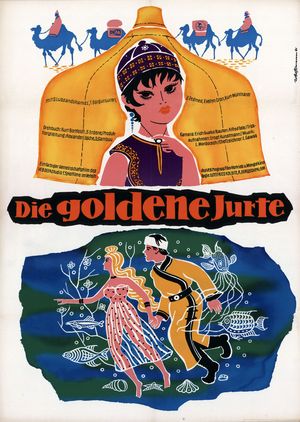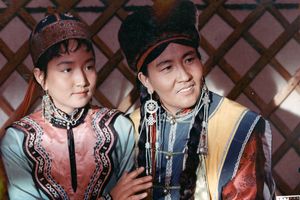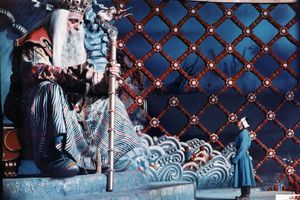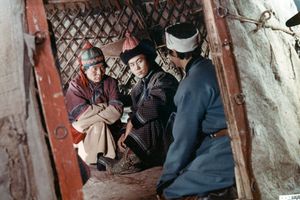Die goldene Jurte
Director: Gottfried Kolditz, Rabschaa Dordschpalam, 79 Min., Color, Feature Film
Deutsche Demokratische Republik (DDR); Mongolei
Mongolkino, Ulan Bator / DEFA-Studio für Spielfilme, 1961
- Film/Video Format
- 35 mm
- Length in m
- 2167
- Other Title
- Mongolisches Märchen; Altan orgoo
- English Title
- The Golden Tent
- Premiere Date
- Release Date (for Cinema)

(Dir.: Gottfried Kolditz, Rabschaa Dordschpalam, 1961) Graphic Design: Werner Gottsmann
Short Summary (English)
Disregarding a commandment of the lamas, the sage Arat tills the Mongolian soil. He sows corn to eradicate the raging famine in the land. He teaches the herdsman Pagwa to do the same in the "Valley of the Red Flowers". To preserve the region's wealth, Pagwa, however; has to closely guard a mysterious chest which may never be opened. But when the herdman's two eldest sons act in contempt of this prohibition, they plunge the entire valley into misery and calamity. The water runs dry and the father suffers gloom and dejection because of this breath of trust. Dawadorshi, his youngest son, sets out to seek counsel from Arat. He attentively takes in the old man's lessons. Heartened and emboldened, he sets off home again. On his way he saves village peasants from perishing of thirst heals a blind girl and rescues the daughter of the water khan. The khan presents him with three precious gifts: a magic cap, a little hammer which makes a golden tent appear; and a lambskin which conjures up rainfall. With the help of these magical powers, Dawadorshi can bring back the herd and the two treacherous brothers. A magnificent house is erected by means of magic and rain, so ardently longed for; is summoned. (Source: Progress Film-Verleih)

(Dir.: Gottfried Kolditz, Rabschaa Dordschpalam, 1961) Photography: Peter Blümel

(Dir.: Gottfried Kolditz, Rabschaa Dordschpalam, 1961) Photography: Peter Blümel
Film Crew
- Director
-
- Gottfried Kolditz
- Rabschaa Dordschpalam
- Script
-
- Kurt Bortfeldt
- Sengiin Erdene
- Camera
-
- Erich Gusko
- Ernst Kunstmann (Trick)
- Film Editing
-
- Hildegard Tegener
- Cast
-
- Dshambaagijn Lubsandshamdz (Weiser Arat / Wolfsjäger Arrasch)
- Zaagani Zegmed (Pagwa)
- Batsuchijn Zorig (Dawadorshi)
- Surengijn Suchbaatar (Jorrup)
- Gambodshawin Zegmed (Jombo)
- Zedendambin Nordshmaa (Sarran-Gerrel)
- Tschimedijn Dolgursuren (Sendema)
- Kurt Mühlhardt (Wasserkhan)
- Evelyn Cron (Tochter des Wasserkhan)
- Assistant Director
-
- Ursula Pohle
- Assistant Camera
-
- Peter Dietrich
- Production Design
-
- Alfred Tolle
- Script Editing
-
- Willi Brückner
- Music
-
- L. Mordorsch
- Sound
-
- Max Sandler
- Werner Klein
- Costume Design
-
- Martin Dörre
- Make-Up
-
- Gerhard Petri
- Props
-
- Günter Zaleike
- J. Jondosambuu
- Production Management
-
- Alexander Lösche
- Damdini Sambuu
- Unit Production Management
-
- Erich Kühne
- Werner Liebscher
- N. Gombossuren
- Design
-
- A. Gawaa (Zeichnungen)
- DEFA Photography
-
- Peter Blümel
- Dubbing (Dubbing Actor)
-
- Friedrich Richter (Weiser Arat / Wolfsjäger Arrasch)
- Fritz (auch: Friedrich) Links (Pagwa)
- Hartmut Kirschke (Dawadorshi)
- Helmut Müller-Lankow (Jorrup)
- Edwin Marian (Jombo)
- Helga Labudda (Sarran-Gerrel)
- Lotte Loebinger (Sendema)
Short Summary (German)
(Koproduktion DDR/Mongolei)
Der Weise Arat bricht gegen das Gebot der Lamas die mongolische Erde auf, um Korn zu säen und die Hungersnot im Land zu beseitigen. Er lehrt den Hirten Pagwa im Tal der Roten Blumen ebenso zu handeln. Doch Pagwa lässt dieses Tal verdorren. Dawadorshi, sein jüngster Sohn, macht sich auf den Weg zum Weisen Arat, um Rat zu erbitten. Er hört aufmerksam den Lehren des Alten zu und macht sich auf den Heimweg. Unterwegs bewahrt er die Bauern eines Dorfes vor dem Verdursten, heilt ein blindes Mädchen und rettet die Tochter des Wasserkhans, wofür er drei wertvolle Geschenke erhält. Schließlich kommt er glücklich zu Hause an und bringt das Tal wieder zum Erblühen.
(Quelle: Das zweite Leben der Filmstadt Babelsberg. DEFA-Spielfilme 1946-1992)
Short Summary (Other Languages)
Per combattere la carestia, il saggio Arat infrange il precetto dei monaci Lama che vieta di dissodare la terra e semina grano. Insegna a fare lo stesso anche al pastore Pagwa nella Valle dei fiori rossi, ma questo lascia inaridire il terreno. Dawadorshi, suo figlio minore, si reca da Arat per chiedergli consiglio. Rientrando a casa, difende i contadini di un villaggio dalla sete, guarisce una bambina cieca e salva la figlia di un nobile, ricevendo tre preziosi regali. Col suo aiuto anche la valle torna a fiorire. (Italienisch)



